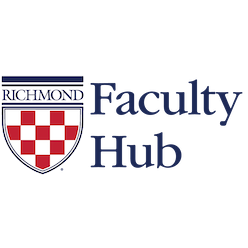Dear Faculty Colleagues,
Congratulations on completing another fall semester and best wishes for your winter break.
The Faculty Hub would like to make you aware of our spring term opportunities and highlight some successful programs from fall term. Please see the Faculty Hub website to register for spring programs or email us if you have any questions.
NEW – Faculty Hub Associates – Deadline for application is January 29, 2020
The Faculty Hub announces a pilot program for faculty to share their areas of expertise related to enhancing excellence in faculty teaching and/or scholarship and creative works. Please see the attached call for applications for the new Faculty Hub Associates program. Questions may be directed to Linda Boland, Director of the Faculty Hub.
Sign up now for Faculty Hub events in January
On January 9, the Faculty Hub welcomes Michael Palmer, Director of the Center for Teaching Excellence at the University of Virginia, for a workshop on learner-centered syllabi. Registration is required for Creating Syllabi for Courses You’ll Love to Teach and Your Students Will Love to Take. Please join your colleagues for post-new year coffee, tea, and bagels at 9:00 a.m. plus a chance to make a significant change to your teaching in just two hours (9:30-11:30 a.m.). We hope you will join us!
From January-March, we are running a Faculty Hub Book Group to explore how intentional utilization of technology can help students achieve course learning objectives. Two discussion groups are being formed, and we still have some openings in the breakfast group. Please sign up on our events page, and we will send you our guide book Intentional Tech (Derek Bruff, Vanderbilt University).
Other spring term events
The Faculty Hub Talks program got off to a great start in the fall term with two sessions led by Nicole Maurantonio and Doron Samuel-Siegel. In the spring term, we welcome David Wilkins, Chris von Rueden, Corey D. B. Walker, and Rana Dajani. Hub Talks start at 12:12 p.m. with an 18-minute presentation followed by a discussion that outlasts the duration of the talk! Faculty are finding these to be a useful form of community-building and engagement across disciplines. Please register here. We offer lunch, so you can visit, eat, and learn — all in one hour!
We are planning ahead for a faculty professional development event on Wednesday, May 6. We have invited Claire Howell Major, a frequent speaker at faculty development conferences and author of many books on pedagogy. She will be working with us on approaches to active learning and engaging our students — all faculty will find this useful. We are working out the details and registration will be available soon.
NEW – We are working on a concept for a pre-summer Faculty Hub Institute beginning on the Tuesday after Commencement, just before the time period when many faculty re-focus on summer scholarship or creative works. We are brainstorming about short, intense (2-2.5 day) learning experiences that will have immediate impact on faculty scholarship and/or teaching. This year’s focus is Data Visualization Using Tableau. Our approach will be a cross-disciplinary experience to help faculty develop new skills to make data presentations more dynamic, engaging, clear, and interpretable. Likewise, this in-house institute will help establish a community of faculty learners. We aim to rotate the Hub Institute topics annually and may be able to offer a small stipend for participation. Would this type of learning experience benefit your work? Please share your thoughts with Technology Consultant Andrew Bell. Our planning process depends on your input.
Highlights from the fall semester 2019:
- We ran our first Teaching Squares program to facilitate peer observation and self-reflection about effective teaching across disciplines. Early feedback has been positive, and a January gathering of this cohort will help share the value of faculty participation in the program.
- We initiated an Early Career Faculty Seminar program; the inaugural cohort focused on inclusive pedagogy in the fall term. We will continue our work together this spring with a focus on small-scale changes to enhance teaching and student learning. All early career faculty are invited to join us. Please contact Linda Boland if you are interested.
- Other successes this fall included several inclusive pedagogy trainings, one-on-one academic technology consultations, development of video training modules, planning for upcoming space renovations for the new Faculty Hub in Boatwright Library, and other behind-the-scenes development of procedures and plans within the Hub. We are excited to continue to expand and improve programming and opportunities to help faculty grow in their professional development.
- We developed a Faculty Hub statement about confidentiality with respect to individual faculty consultations; please see our website for details.
The Faculty Hub initiated its work in the fall term of 2019 with the goals of fostering excellence in teaching, cultivating cross-disciplinary interactions for scholarly exchange, and promoting professional development for faculty at all career stages. We encourage faculty to contact us if you have ideas and needs that we might help service, or if we can connect you to campus partners who may also be able to assist you.
Best wishes for a healthy and happy holiday season from the Faculty Hub!
